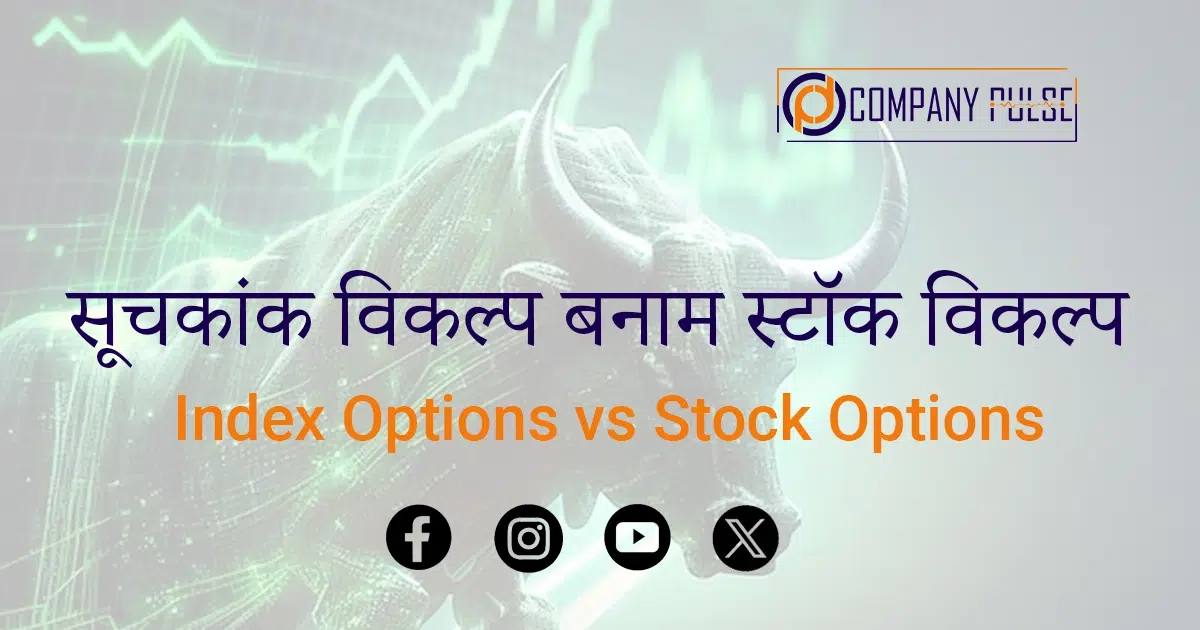Index Options vs Stock Options
In the dynamic world of the Indian stock market, options trading offers investors a plethora of opportunities to capitalize on market movements. Among the various types of options available, two prominent categories are Index Options and Stock Options. Understanding the nuances between these two can empower investors to make informed decisions and enhance their trading strategies. In this article, we’ll delve into the key differences between Index Options and Stock Options in the context of the Indian stock market.
Index Options:
Index options derive their value from a stock market index, such as the Nifty 50 or the Sensex. These options give investors the right, but not the obligation, to buy or sell the entire index at a specified price within a predetermined period.
One of the primary advantages of index options is their ability to provide exposure to the broader market without the need to trade individual stocks. This diversification can help mitigate risks associated with individual company performance. Additionally, index options are settled in cash, simplifying the trading process for investors.
Advantages of Index Options:
One of the primary advantages of Index Options is their ability to offer exposure to the broader market without the need to invest in individual stocks. This allows investors to hedge against market volatility or speculate on overall market trends. Additionally, index options are settled in cash, eliminating the complexities associated with physical delivery of underlying assets.
Stock Options:
Stock options, on the other hand, are contracts where the underlying asset is a specific stock listed on the Indian stock exchanges. Similar to index options, stock options grant investors the right to buy (call option) or sell (put option) a particular stock at a predetermined price within a specified timeframe.
Stock options offer investors the flexibility to tailor their trading strategies based on their outlook for individual companies. Whether bullish, bearish, or neutral, investors can utilize stock options to capitalize on their market sentiments. Moreover, stock options can be used for income generation through strategies like covered calls and put writing.
Advantages of Stock Options:
Stock Options provide investors with the opportunity to leverage their positions, as they allow control over a larger quantity of shares with a relatively smaller investment. Moreover, stock options can be utilized for income generation through strategies like covered calls or as part of more complex trading strategies.
Key Differences:
1. Underlying Asset: The primary distinction between index options and stock options lies in their underlying assets. Index options are based on stock market indices, whereas stock options are linked to individual stocks listed on Indian exchanges like NSE and BSE.
2. Diversification vs. Specificity: Index options provide exposure to a diversified basket of stocks, offering broad market coverage. In contrast, stock options allow investors to focus on specific companies, catering to their individual preferences and market outlook.
3. Liquidity and Volume: In the Indian stock market, index options generally exhibit higher liquidity and trading volume compared to stock options. This higher liquidity can lead to tighter bid-ask spreads and smoother execution for index options traders.
4. Volatility and Risk: Stock options are often subject to higher volatility compared to index options, as they are influenced by the performance of individual companies. On the other hand, index options may offer more stability as they reflect the collective performance of multiple stocks.
Conclusion:
In summary, both index options and stock options present unique opportunities for investors in the Indian stock market. Whether seeking broad market exposure or focusing on specific stocks, options trading can be a valuable tool for portfolio diversification and risk management. By understanding the differences between index options and stock options, investors can craft well-informed trading strategies that align with their financial goals and risk tolerance. As with any investment activity, conducting thorough research and seeking guidance from financial experts are essential steps for success in options trading.
(Disclaimer: The above article is for informational purposes only and should not be taken as any investment advice. Company Pulse suggests its readers/viewers to consult their financial advisor for any financial advice.)
इंडेक्स विकल्प और स्टॉक विकल्प के बीच अंतर: कौन सा बेहतर है
भारतीय शेयर बाजार की गतिशील दुनिया में, विकल्प ट्रेडिंग निवेशकों को बाजार की गतिविधियों से लाभ उठाने के ढेर सारे अवसर प्रदान करती है। उपलब्ध विभिन्न प्रकार के विकल्पों में से, दो प्रमुख श्रेणियां इंडेक्स विकल्प और स्टॉक विकल्प हैं। इन दोनों के बीच की बारीकियों को समझने से निवेशकों को सूचित निर्णय लेने और अपनी ट्रेडिंग रणनीतियों को बढ़ाने में सशक्त बनाया जा सकता है। इस लेख में, हम भारतीय शेयर बाजार के संदर्भ में इंडेक्स विकल्प और स्टॉक विकल्प के बीच प्रमुख अंतरों पर चर्चा करेंगे।
सूचकांक विकल्प:
सूचकांक विकल्प अपना मूल्य शेयर बाजार सूचकांक से प्राप्त करते हैं, जैसे निफ्टी 50 या सेंसेक्स। ये विकल्प निवेशकों को पूर्व निर्धारित अवधि के भीतर एक निर्दिष्ट मूल्य पर संपूर्ण सूचकांक खरीदने या बेचने का अधिकार देते हैं, लेकिन दायित्व नहीं।
इंडेक्स विकल्पों के प्राथमिक लाभों में से एक व्यक्तिगत स्टॉक में व्यापार की आवश्यकता के बिना व्यापक बाजार में एक्सपोज़र प्रदान करने की उनकी क्षमता है। यह विविधीकरण व्यक्तिगत कंपनी के प्रदर्शन से जुड़े जोखिमों को कम करने में मदद कर सकता है। इसके अतिरिक्त, सूचकांक विकल्पों का निपटान नकद में किया जाता है, जिससे निवेशकों के लिए ट्रेडिंग प्रक्रिया सरल हो जाती है।
सूचकांक विकल्पों के लाभ:
इंडेक्स विकल्पों के प्राथमिक लाभों में से एक व्यक्तिगत स्टॉक में निवेश की आवश्यकता के बिना व्यापक बाजार में निवेश की पेशकश करने की उनकी क्षमता है। यह निवेशकों को बाजार की अस्थिरता से बचाव करने या समग्र बाजार रुझानों पर अनुमान लगाने की अनुमति देता है। इसके अतिरिक्त, सूचकांक विकल्पों का निपटान नकदी में किया जाता है, जिससे अंतर्निहित परिसंपत्तियों की भौतिक डिलीवरी से जुड़ी जटिलताएं दूर हो जाती हैं।
स्टॉक विकल्प:
दूसरी ओर, स्टॉक विकल्प ऐसे अनुबंध हैं जहां अंतर्निहित परिसंपत्ति भारतीय स्टॉक एक्सचेंजों पर सूचीबद्ध एक विशिष्ट स्टॉक है। इंडेक्स विकल्पों के समान, स्टॉक विकल्प निवेशकों को एक निर्दिष्ट समय सीमा के भीतर पूर्व निर्धारित मूल्य पर किसी विशेष स्टॉक को खरीदने (कॉल विकल्प) या बेचने (पुट विकल्प) का अधिकार देते हैं।
स्टॉक विकल्प निवेशकों को व्यक्तिगत कंपनियों के लिए उनके दृष्टिकोण के आधार पर अपनी ट्रेडिंग रणनीतियों को तैयार करने की सुविधा प्रदान करते हैं। चाहे तेजी हो, मंदी हो या तटस्थ, निवेशक अपनी बाजार भावनाओं का लाभ उठाने के लिए स्टॉक विकल्पों का उपयोग कर सकते हैं। इसके अलावा, स्टॉक विकल्पों का उपयोग कवर्ड कॉल और पुट राइटिंग जैसी रणनीतियों के माध्यम से आय सृजन के लिए किया जा सकता है।
स्टॉक विकल्प के लाभ:
स्टॉक विकल्प निवेशकों को अपनी स्थिति का लाभ उठाने का अवसर प्रदान करते हैं, क्योंकि वे अपेक्षाकृत छोटे निवेश के साथ बड़ी मात्रा में शेयरों पर नियंत्रण की अनुमति देते हैं। इसके अलावा, स्टॉक विकल्पों का उपयोग कवर कॉल जैसी रणनीतियों के माध्यम से या अधिक जटिल ट्रेडिंग रणनीतियों के हिस्से के रूप में आय सृजन के लिए किया जा सकता है।
मुख्य अंतर:
- अंतर्निहित परिसंपत्ति: सूचकांक विकल्प और स्टॉक विकल्प के बीच प्राथमिक अंतर उनकी अंतर्निहित परिसंपत्तियों में निहित है। सूचकांक विकल्प शेयर बाजार सूचकांकों पर आधारित होते हैं, जबकि स्टॉक विकल्प एनएसई और बीएसई जैसे भारतीय एक्सचेंजों पर सूचीबद्ध व्यक्तिगत स्टॉक से जुड़े होते हैं।
- विविधीकरण बनाम विशिष्टता: सूचकांक विकल्प व्यापक बाजार कवरेज की पेशकश करते हुए शेयरों की एक विविध टोकरी में एक्सपोज़र प्रदान करते हैं। इसके विपरीत, स्टॉक विकल्प निवेशकों को उनकी व्यक्तिगत प्राथमिकताओं और बाजार दृष्टिकोण को ध्यान में रखते हुए विशिष्ट कंपनियों पर ध्यान केंद्रित करने की अनुमति देते हैं।
- तरलता और मात्रा: भारतीय शेयर बाजार में, सूचकांक विकल्प आम तौर पर स्टॉक विकल्पों की तुलना में उच्च तरलता और ट्रेडिंग वॉल्यूम प्रदर्शित करते हैं। इस उच्च तरलता से सूचकांक विकल्प व्यापारियों के लिए सख्त बोली-मांग प्रसार और आसान निष्पादन हो सकता है।
- अस्थिरता और जोखिम: स्टॉक विकल्प अक्सर इंडेक्स विकल्पों की तुलना में उच्च अस्थिरता के अधीन होते हैं, क्योंकि वे व्यक्तिगत कंपनियों के प्रदर्शन से प्रभावित होते हैं। दूसरी ओर, सूचकांक विकल्प अधिक स्थिरता प्रदान कर सकते हैं क्योंकि वे कई शेयरों के सामूहिक प्रदर्शन को दर्शाते हैं।
निष्कर्ष:
संक्षेप में, इंडेक्स विकल्प और स्टॉक विकल्प दोनों भारतीय शेयर बाजार में निवेशकों के लिए अद्वितीय अवसर प्रस्तुत करते हैं। चाहे व्यापक बाजार जोखिम की तलाश हो या विशिष्ट शेयरों पर ध्यान केंद्रित करना, विकल्प ट्रेडिंग पोर्टफोलियो विविधीकरण और जोखिम प्रबंधन के लिए एक मूल्यवान उपकरण हो सकता है। इंडेक्स विकल्प और स्टॉक विकल्प के बीच अंतर को समझकर, निवेशक अच्छी तरह से सूचित ट्रेडिंग रणनीतियों को तैयार कर सकते हैं जो उनके वित्तीय लक्ष्यों और जोखिम सहनशीलता के अनुरूप हों। किसी भी निवेश गतिविधि की तरह, विकल्प ट्रेडिंग में सफलता के लिए गहन शोध करना और वित्तीय विशेषज्ञों से मार्गदर्शन लेना आवश्यक कदम हैं।
(डिस्क्लेमर: उपरोक्त लेख केवल सूचनात्मक उद्देश्यों के लिए है और इसे किसी निवेश सलाह के रूप में नहीं लिया जाना चाहिए। कंपनी पल्स अपने पाठकों/दर्शकों को किसी भी वित्तीय सलाह के लिए अपने वित्तीय सलाहकार से परामर्श करने का सुझाव देती है।)







I have been browsing online more than 3 hours today, yet I never found
any interesting article like yours. It is pretty worth enough for
me. Personally, if all web owners and bloggers made good content as you did, the net will be much more useful than ever before.
It is the best time to make some plans for the
future and it is time to be happy. I’ve read this post
and if I could I wish to suggest you few
interesting things or tips. Maybe you could write
next articles referring to this article. I desire to read even more
things about it!